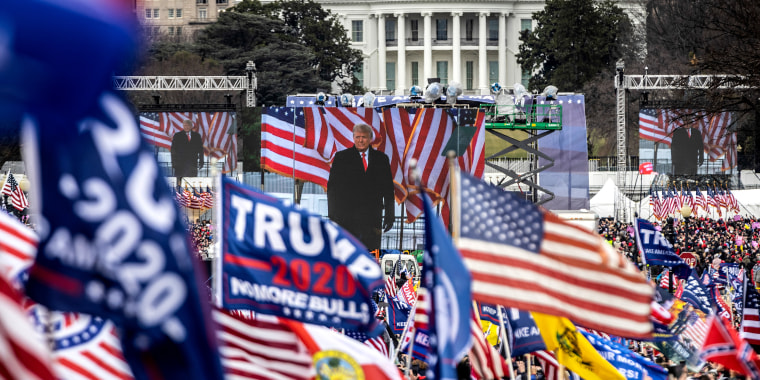All coup conspirators count on being protected when that coup succeeds and they have taken over the government or, in a "self-coup," remained in office by illegal means. But if a coup attempt fails, as it did on Jan. 6, 2021, in America, then those conspirators can see their plans made public and their intent to overthrow a democracy exposed.
The history of coups and authoritarian takeovers are relevant because that history informs the multipronged strategy former President Donald Trump and his conspirators pursued to invalidate President Joe Biden's 2020 victory.
As the House Select Committee to Investigate the January 6th Attack on the United States Capitol holds its first public hearing this week, and block the democratic transfer of power.
Trump's refusal to accept the results of the Nov. 3, 2020 election created the circumstances for actions that, though exceptional in American history, have always been typical moves for autocrats who are trying to avoid leaving office. By purging his inner sanctum, starting with that Nov. 9 firing of Defense Secretary Mark Esper and bringing back in far-right operatives such as General Michael Flynn, Roger Stone and Steve Bannon, Trump created a circle of hard-core loyalists willing to do anything to keep their leader in the White House.
The House Jan. 6 committee is kicking off the first of its public hearings on Thursday, June 9 at 8 p.m. ET. Get expert analysis in real-time on our live blog at msnbc.com/jan6hearings.
First, Trump evoked the tradition of military coups by considering martial law and exploring the idea of using the military to facilitate a re-run of the election. That is why Esper, who had resisted deploying active-duty troops against racial justice protesters, had to go. Days later, the chairman of the Joint Chiefs of Staff, Gen. Mark Milley, in a Veterans Day address at the National Museum of the United States Army, made a point of saying that the military does not take an oath to any individual, "king or queen, or tyrant or dictator," but only to the Constitution.
On that Dec. 1, a week before Trump pardoned him, Flynn retweeted an ad from a group called We The People Convention, which asked Trump to suspend the Constitution so the military could oversee a new election. Flynn's efforts to drum up Republican support for martial law prompted a warning from 10 former defense secretaries that military involvement in elections "would take us into dangerous, unlawful, and unconstitutional territory."
As he explored a military option, Trump also attempted the 21st century despot’s favorite trick of electoral manipulation. He alleged extensive voter fraud and pressured state officials, such as Georgia's Secretary of State Brad Raffensperger, to "find" votes sufficient to overturn Biden’s win there. Four years of rigged election talk had primed those in his personality cult to accept his claim that he, and not Biden, had won the election. The Big Lie had traction because of the many thousands of small lies Trump and his GOP and media allies told about Democrats' criminality, rampant fraud and trickery in American elections and the president's victimization by his enemies.
Thankfully for our democracy, Trump's process of autocratic capture had not advanced far enough by the end of 2020. At least 86 Republican and Democratic judges rejected his efforts to overturn state election results. Nor did most state election officials cooperate. Raffensperger, for example, taped his call with Trump, which was then leaked to the press, exposing the president's machinations.
That is why, with the military and electoral options looking less viable, Trump's extremist inner circle channeled early fascism and its credo of bringing about political change through violent action. They called on militia members, white supremacists and other extremists to come to Washington on Jan. 6 to "stop the steal" and rescue him from defeat by blocking the Electoral College certification of Biden's victory. "Big protest in D.C. on January 6," Trump tweeted on Dec. 19 about the event. "Be there, will be wild!"
Of course, once the Jan. 6 assault on the halls of power began, Trump was nowhere to be found. He watched the violence unfold on television. It's not surprising that some extremists seemed to have understood his Jan. 7 speech, which ended with the chilling sentence "our incredible journey is only beginning," as another version of the "stand back and stand by" comment he addressed to the Proud Boys during a September 2020 debate with Biden.
All those networks of coup planning will likely come into focus during the House committee hearings, as will the desired endgame of Trump's machinations: a takeover of government straight out of authoritarian history. This matters because Jan. 6 was an inside job with Trump advisers, his campaign and donors among the organizers and participants.
Whether or not Trump runs for office in 2024, the time-tested methods of autocracy — electoral manipulation, violence and attempts to politicize the military — are now part of the way the GOP conducts its business as a far-right party. After Jan. 6, nothing is off the table: Extremists might well view the failed coup as a trial run. "That's what we f---ing need to have, 30,000 guns up here," said one rioter that day, frustrated that he was not entering the Capitol more rapidly. "Next trip," someone answered him.
